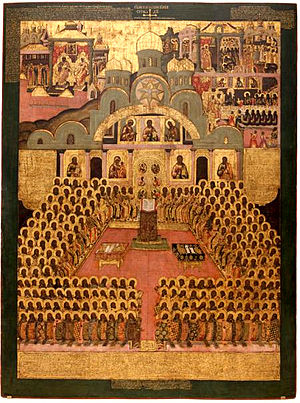
Seventh ecumenical council, Icon, 17th century, Novodevichy Convent, Moscow (Photo credit: Wikipedia)
You know the word… “ecumenical”. At least, I always used to think it was a dirty word. What does it mean to be “ecumenical”? It refers (in my usage) to the interrelations of various churches and ministries under the wide umbrella of “Christianity” (though others may take it in a broader sense). I have discovered great difficulties and benefits in my ecumenical work over my brief 13 years of pastoral ministry.
I had opportunity several years ago to participate in the largest ecumenical gathering of Christian leaders in Minnesota’s history. It was certainly an affair to remember. Bishops, Presidents, Superintendents from nearly every flavor of the Christian tradition represented in Minnesota…and Rick. I was the lone Assembly of God representative. Yes, that’s right. I represented the Assemblies by myself only because there was a scheduling issue for ALL the actual leadership (though to be fair I am an assistant presbyter in one of the fifteen sections of MN 🙂 ). I felt like I should have made a cape or a really tall hat to wear that day.
It was (to some extent) a debacle as there were numerous attempts to simply boil everything down to the most common denominator among us. That really doesn’t leave much of anything. In the end, about all that could be agreed upon (from my perspective) was that we could corporately do community projects to alleviate social ills (yes, that generic). I left feeling rather disheartened by the whole affair. Maybe I’m too much of a curmudgeon, but I really would rather not think we are being terribly “ecumenical” when all we have to really agree on was to care for the poor (among a few other things).
However, on the local level, I’ve found a greater sense of the ecumenical spirit I have learned to long for: corporate worship, prayer, study of Scripture, ministry, service. It hasn’t always been so positive in all of the communities I’ve pastored, but in Karlstad I have found a tremendous camaraderie and a thorough desire to work together for the benefit of the faith community and the wider community. Our close-knit community means none of our congregations really have a lot of others of our identical theological-denominational flavor and so we live in a place that seems to better facilitate the potential of working together…or simply not surviving in the ministry. I know of others who serve where they can be more “selective” about their relationships with other pastors and congregations, but in a rural setting it seems nearly impossible to escape the need for one another. I would like to think I seek to be ecumenical for greater reasons than such pragmatics would suggest, but it certainly helps to keep me working at the relationships in my community.
From my perspective, a genuine ecumenical spirit means praying for and with one another, sharing in the work of serving the community, sitting under the authority of the Word together, admonishing each other toward faithfulness and being likewise admonished, and even (dare I say it) sharing meals together and even the Lord’s Supper. Now that is an ecumenical vision I can give myself to! And perhaps even an indicator of “being one” as Jesus is with His Father (!). Now that is radical. 🙂
So what are your thoughts on being “ecumenical”? Do you find it to be a strength or weakness of your ministry? How has your “ecumenical” experience been?
_________________
Originally published by me at bluechippastors.org on October 1, 2012.
